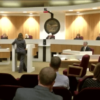Injunction sought against new law on independent contractors

(The Center Square) – Less than two months before implementation, a federal law impacting gig workers is being challenged in a Georgia court.
Founders of Fight for Freelancers, a coalition of more than 2,500 independent contract workers in varying professions, seeks an injunction to prohibit enforcement of the new law announced this month by the U.S. Department of Labor. The case was filed Tuesday in the U.S. District Court for the Northern District of Georgia, and known as Warren v. U.S. Department of Labor.
Six criteria, none weighted more than the other, are to determine independent workers’ legal protections and compensation under the new law. The previous rule prioritized the company’s control of the worker and the “entrepreneurial opportunity” the work provides.
Opposition among independent contractors to this proposed rule change has been widespread and overwhelming – just as they were with previous state and federal legislative attempts to limit the choice of self-employment since 2019,” said Kim Kavin of Fight For Freelancers in a statement released by her legal counsel. “Misclassifying us as employees is not protecting us. It is attacking us and attempting to destroy our chosen careers.”
Kavin is a named plaintiff, as are Karen Warren, Deborah Kaplan and Jennifer Singer. Kavin is a freelance writer and editor; Warren is a freelance writer and author; Kaplan is a freelance journalist and content marketing writer; and Singer is a freelance writer, writing coach and editor.
Enforcement and interpretation were among the immediate critiques of the Biden administration move that subsequently placed Julie Su, the Department of Labor’s interim secretary, as the face of the new law.
In a statement, Su said, “Misclassifying employees as independent contractors is a serious issue that deprives workers of basic rights and protections. This rule will help protect workers, especially those facing the greatest risk of exploitation, by making sure they are classified properly and that they receive the wages they’ve earned.”
The coalition disagrees with the means to an end.
In a statement from plaintiffs’ legal counsel, Pacific Legal Foundation attorney Wilson Freeman said, “The Labor Department’s new classification rule makes it harder to be an independent contractor by muddying the waters between who is an independent contractor and who is an employee. These rules chill Americans’ ability to work by threatening businesses with ruinous civil and criminal liability.”
Most often, independent contractors do not necessarily get minimum wage or benefits such as health coverage, Social Security contribution, unemployment insurance, overtime pay, paid sick leave or paid vacations. It is a known component of gig work, and most often accepted.
The half dozen considerations in the new rule, according to a release, “are any opportunity for profit or loss a worker might have; the financial stake and nature of any resources a worker has invested in the work; the degree of permanence of the work relationship; the degree of control an employer has over the person’s work; whether the work the person does is essential to the employer’s business; and a factor regarding the worker’s skill and initiative.”










